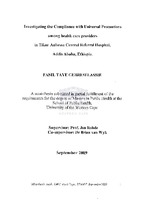| dc.contributor.advisor | Rohde, Jon | |
| dc.contributor.advisor | Van Wyk, Brian | |
| dc.contributor.author | Gebreselassie, Fasil Taye | |
| dc.date.accessioned | 2014-09-18T10:42:07Z | |
| dc.date.available | 2014-09-18T10:42:07Z | |
| dc.date.issued | 2009 | |
| dc.identifier.uri | http://hdl.handle.net/11394/3674 | |
| dc.description | Magister Public Health - MPH | en_US |
| dc.description.abstract | This study has reveled the levels of knowledge and compliance towards Universal Precautions and examined the factors that are influential in having a positive and negative effect on their adoption by healthcare practitioners in practice. Despite acceptable knowledge regarding the potential for infection and mechanisms to prevent these infections, this study has found out that health care workers are not as compliant with universal precautions as they need to be. The findings that compliance correlated directly with knowledge, with in-service training and with availability of protective equipment, provide important indications for future interventions. Therefore a regular on job refreshing training program on Universal Precautions, a written guideline and reminder poster on Universal Precautions and personal protective equipment need to be made available for all health care providers in every department of the hospital for better compliance. | en_US |
| dc.language.iso | en | en_US |
| dc.publisher | University of Western Cape | en_US |
| dc.subject | Universal precautions | en_US |
| dc.subject | Compliance | en_US |
| dc.subject | Protection barriers | en_US |
| dc.subject | Health care providers | en_US |
| dc.subject | Blood borne pathogens | en_US |
| dc.subject | Occupational exposure | en_US |
| dc.subject | Needle stick injuries | en_US |
| dc.title | Investigating the compliance with universal precautions among health care providers in Tikur Anbessa Central Referral Hospital, Addis Ababa, Ethiopia | en_US |
| dc.type | Thesis | en_US |
| dc.rights.holder | University of Western Cape | en_US |

